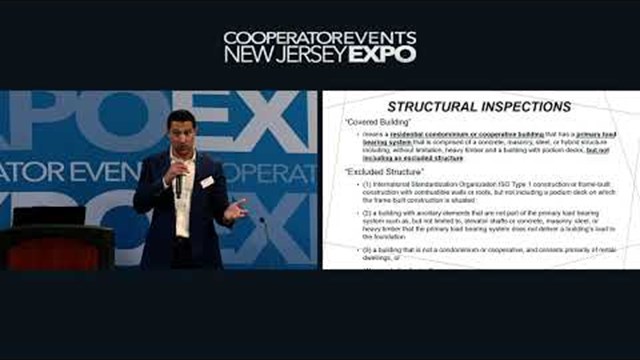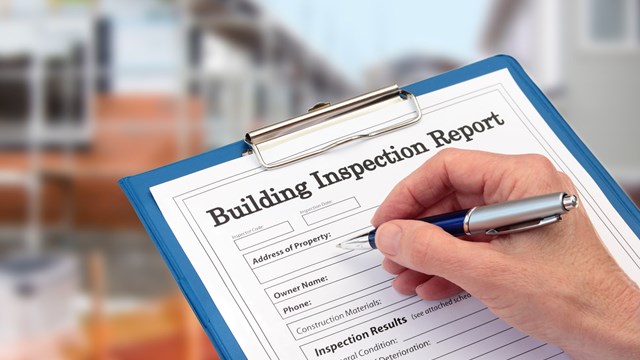Real estate lore has its share of stories about merciless, if not downright unscrupulous, city inspectors popping in on unaware building owners, conducting unscheduled examinations of all types, and sometimes even demanding payoffs in exchange for passing grades. In reality, however, the image of the shady, corrupt inspector couldn’t be further from the truth. In today’s world of short-staffed city agencies, hair-trigger litigation, and increased board transparency, inspections, safety, and efficiency rule the day.
Take a Good, Hard Look
“Community associations consist of complex components that need to be inspected, both during transition and as part of regular maintenance,” explains Stuart J. Lieberman, a shareholder with law firm Lieberman & Blecher, P.C., in Princeton. In order to achieve a safe space for residents, staff, visitors and anyone else who may find themselves strolling by, it’s imperative that a board find the right vendor for a particular job.
Oftentimes, it can fall to the property manager to ascertain what needs be maintained and who is appropriate to do so. “The property manager should be able to make a recommendation based upon personal skill and experience,” says one East Coast management pro, “as well as the size of the project and necessary funding. The key really is to make sure that the manager knows when inspections are due and when permits must need be renewed, then follow up on that, whether with a city or state official, or with a vendor. Don’t assume that a vendor is going to do it on their own.”
And when it comes to scheduling inspections or service, most association managers recommend a “90-60-30” schedule, meaning that a smart community administrator will reach out to agencies or vendors 90 days before an inspection is due—then follow up at 60 days out, and finally, if need be, stress the urgency if you have 30 days til deadline and still haven’t gotten the requisite visit.
There was a time in the not-so-distant past when, in fact, all inspections of this type were done by city agencies. In some situations that still happens today, but other agencies– buildings departments, for instance – now defer in many cases to independent third parties to inspect and report on the functions and fitness of many building systems such as elevators, boilers, facades, and water towers. “Fees are involved in everything,” says Meryl Sacks, President of Meryl Sacks Real Estate Management Corp., an active co-op management firm based in New York. City agencies may not send out personnel in their employ to do inspections, but they do charge fees from building owners, co-ops, condos or rental owners for the filing and updating of inspections required to protect the safety of residents.
What Gets Inspected?
So what kind of inspections are there? In New Jersey, it can be a long list, including — but certainly not limited to — items like elevators, boilers, fire safety systems, petroleum bulk storage units, property registration documents, façade condition, and sprinkler/standpipe status —as well as a myriad of notices including, but again, not limited to, window guards, lead paint, and smoke detectors. Responsibility for the completion and filing of these reports falls on a variety of experts and professionals, including managing agents.
Façade Maintenance
While in the suburbs, the likelihood that something will come careening off a building exterior and strike a passerby is minimal, but, in the city, it is a major concern. Anything that can cause an injury, whether from the aforementioned scenario, a trip-and-fall, or anything else that can afflict a person of any age, must be considered and its risk minimized, if not eliminated.
“If it’s a high-rise building and the facade has started to deteriorate, that’s actually a liability to the association,” says Lynn Voorhees, Director of Community Association Services at DW Smith Associates in Wall Township. “Because if concrete or masonry chunks start falling, they could easily cause harm. So, you’re looking at two things here: one is degradation of the structural integrity of the building, and the other one is the risk of physical harm.”
In New Jersey, the requirements of facade inspections vary depending on what municipality the building is in. The state’s Department of Community Affairs (DCA) runs housing inspections every few years to make sure exteriors, as well as common spaces, are up to code. “If the DCA inspects your building and finds you in violation, they give you a time limit to get an estimate and repairs done, otherwise they can impose a fine,” says Brian Bolger, owner of Magnolia Development Group in Succasunna.
Beyond that, there are no other state maintenance requirements. New Jersey expects associations to handle ongoing upkeep on their own. Within the association itself, the board has the latitude to determine to some degree when inspections and repairs are carried out. While every state-sanctioned inspection has to be completed by the end of the year, some boards may want to time the inspection so it’s not performed right after the exterior had just been painted, for example.
Facade materials, weather conditions, and the age of the building in question will affect what inspectors are looking for when they analyze an exterior, but property managers should follow an established protocol to make sure corners aren’t cut, and any deterioration isn’t missed. “After the winter’s over, property managers should bring in one of their general construction contractors—someone familiar with the entire building envelopes,” says Bolger. “The contractor will do a walk-around each of the buildings and inspect all the key areas to make sure there’s isn’t any water penetration. This doesn’t involve the removal of any stucco or brick; if they notice a problem, they’ll make a note of the area, and put it on their spring project list.”
Elevators
Every building is different, and not every building is subject to the same inspections. Clearly, a walk-up building without an elevator doesn’t have to worry about an elevator inspection. But for those residents who live in elevator buildings, a safe and functioning lift is among the most critical and important systems in the building.
Andrew Batshaw, Executive Director with FirstService Residential New Jersey, explains that in the Garden State, an annual inspection by the Department of Community Affairs (DCA) is required. As part of that report and inspection, a quarterly inspection and report must be completed by a third party — usually the elevator services vendor or an engineer. The quarterly reports become part of the annual inspection report.
Boilers, Fire Safety, and Bulk Petroleum Storage
Boilers are another vital component to the operation of a property. Boilers are another vital component to the operation of a property. “The boiler inspection requirements in New Jersey are very complicated,” explains Batshaw. The state requirements for how often and what kind of inspection is necessary vary based on boiler size and pressure type. Managers rely on mechanical contractors and vendors to walk them through what inspections are required by the New Jersey state bureau in charge of boiler and pressure compliance.
Cindy Petrenko, manager of several co-op and condominium properties in central New Jersey, says that fire prevention inspections are a major area of focus in the state. She explains that as in the case of all residential buildings, all fire extinguishers must be inspected annually. In addition, sprinklers, pumps, and standpipes must be inspected annually and those reports must be filed with local fire officials. Local fire officials inspect annually, and New Jersey state DCA officials inspect every five years. “The testing, inspection and report are completed by the vendor with whom you have a contract and then reported to the state,” says Batshaw. Buildings constructed prior to the adoption of the current uniform construction code may be required to do upgrading of their systems if they undertake major alterations. Petrenko also mentions that fire officials also complete an annual inspection of fire suppression units called water closets and that the water pump station, which provides water to sprinkler stations are inspected annually to insure proper use and operation.
According to Batshaw, while underground oil storage tanks “are few and far between” these days, one does occasionally hear of associations having to spend tens of thousands of dollars to dig up and dispose of one found on their property—usually in the course of a major capital project. “There are very few of these oil storage tanks still around — we haven’t encountered many of them,” says Batshaw. Nationally, fuel tanks are regulated by the federal Environmental Protection Agency (EPA), and when one is found, the proper way to handle them is to decommission them. Decommissioning is expensive. “In many cases, the tanks have been out of use so long many residents don’t even know they’re there,” Batshaw says.
Property Registration and Notices
One annual filing that doesn’t require an inspection is the annual property registration. According to both Batshaw and Petrenko, every New Jersey building must file a property registration form annually. The registration generally includes the names of the managing agent and at least one officer of the corporation or association that owns the property. Filing this registration on a timely basis may seem like a low-priority issue for many, but in truth it’s very important. This is where the local municipal offices look for contact information in the case of legal actions, justified or otherwise. Imagine that you paid your real estate taxes, but they got lost in the mail. The local government must notify you. If that notice goes to the wrong place, your property could end up in default for non-payment of taxes resulting in a move to foreclose.
There are also a myriad of notices that must be filled out and filed every year. These items are generally handled by the managing agent and include resident confirmation of things like window guards, possible presence of lead paint, fire safety plans, bed bugs, and others. These notices can be more complicated in reporting than one might think, and are time-consuming for both agents and boards.
Both Batshaw and Petrenko say be aware! Retain the services of a competent managing agent, one that is fully familiar with compliance. In addition, attend trade shows, get educated, and track everything coming due. In the end, it’s your responsibility.
A J Sidransky is a staff writer/reporter for The New Jersey Cooperator, and a published novelist.







Comments
Leave a Comment